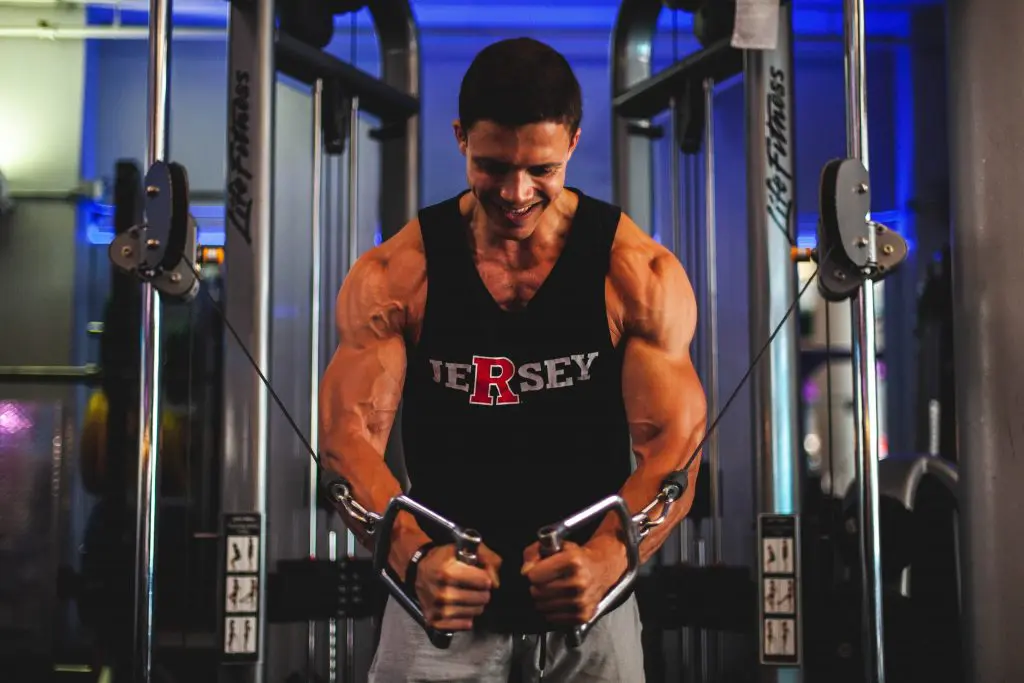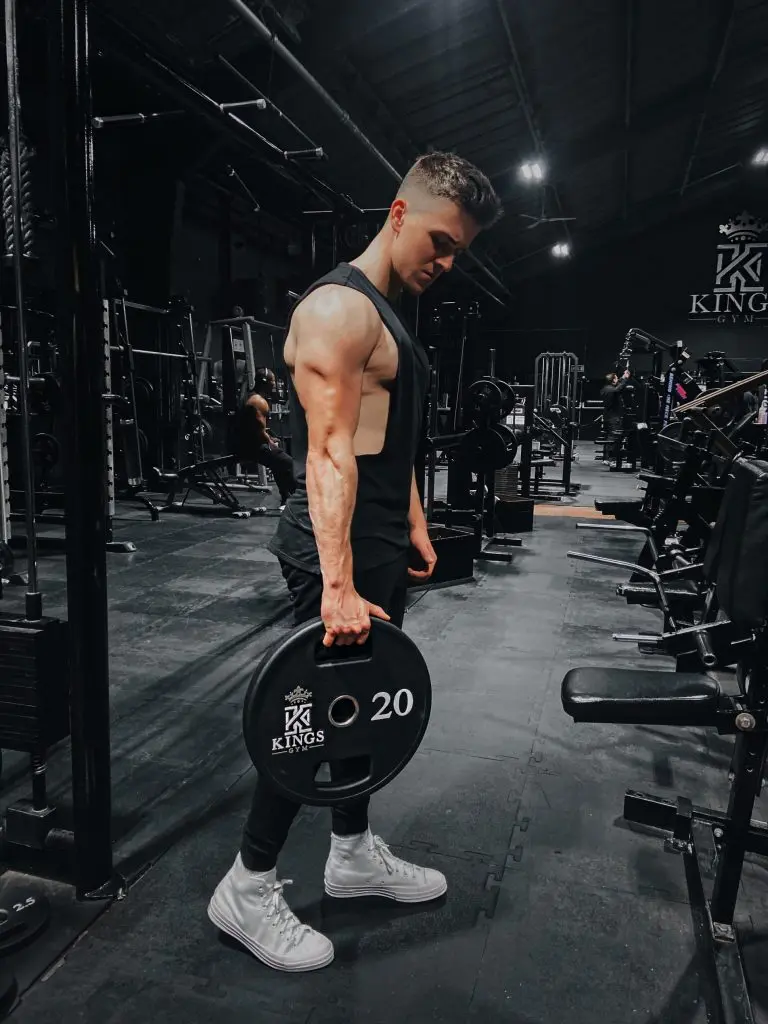Why do NBA Players Bench Press?
Whether you’re a regular gym-goer or not, you likely know that the bench press is one of the most important, and difficult, exercises to complete. The bench press, useful for building upper-body and arm strength, is also one of the most widely discussed workouts, with gym-goers typically discussing their personal bench records.
However, the case for the bench press amongst basketball and NBA players is a bit more nuanced. And while many basketball and NBA players do bench, a vast majority opt not to. Below, we are going to look at both why NBA players do and don’t bench and what benefits the bench press exercise can have on a basketball players overall game.
Overall Benefits of the Bench Press
The bench press is one of the core exercise routines that a fitness-minded individual can complete. Coupled with the deadlift and the squat, the bench press is typically seen as a show of strength and can provide a complete and full-body workout.
And while the bench press motion is quite easy, mastering the exercise and increasing the weight can be difficult. However, by mastering the bench press, you can add significant strength to your upper-body, pectoral muscles, arms, and shoulders.
Similarly, adding bench presses to your weight-training journey can help you to increase and improve muscular performance. This performance can be especially helpful for basketball players looking to increase their overall rebounding skills, as they box-out opposing players for proper position and spacing.

Different Types of Bench Presses
While the most popular form of a bench press is done lying flat on a bench, there are multiple variations to the bench press. Each variation has its own benefits and different variations should be chosen dependent on what an individual is looking to achieve.
- Traditional Bench Press – the traditional bench press is also the most popular form of the bench press. Often the bench press completed by individuals looking for additional toneage and definition around the pectoral muscles, the traditional bench press is completed by lying completely flat on the bench and pressing a barbell, with or without added weights, up and down at the chest level.
- Incline Bench Press – the incline bench press is another popular bench press and is meant to focus and provide isolation to the upper chest and shoulder muscles. To perform, the bench is angled between 45-60 degrees, allowing you to lean slightly back. And similar to the traditional bench press, you will press the barbell up and down against your chest.
- Decline Bench Press – an inverse of the incline bench press, in the decline bench press, you will be slightly declined, with your feet in a higher position than your head. The decline bench press focuses more on your lower chest and shoulders.
- Narrow Grip Bench Press – the narrow grip bench press is another variant of the traditional bench press. However, rather than angling the bench, you will narrow your hands closer to the center of the barbell. The narrow grip bench press is meant to better help tone your triceps and forearms.
Benefits of the Bench Press for Basketball Players
While the bench press is one of the most popular exercises for gym-goers and fitness buffs, its usage is less so for basketball and NBA players. While we will discuss the exact reasons as to why basketball and NBA players don’t focus too much energy and time on the bench press further in this article, we did want to discuss some of the overall benefits a basketball player can gain by incorporating the bench press to their gym routine.
- Increased Upper Body Strength – perhaps above all else, the biggest gain a basketball player can gain by completing the bench press is an increase in their upper body strength. The bench press specifically focuses on the pectoral, shoulder, tricep, and upper chest muscles. These muscles are all important in the game of basketball and can better help with both offensive and defensive efficiency in the sport.
- Bigger Pectoralis Major – whether you’re playing a pick-up game of basketball or are in a regulation league, bigger, more defined muscles can help you to exude strength and limit the occurrence of bully ball.
- Increased Shooting Range – while a majority of the power in shooting thee basketball comes from the lower-body and your ability to lift yourself from the ground, your triceps and forearms play a major role in pushing the ball forward. By working out on the bench press, basketball players are able to provide themselves with additional shooting range and will be able to shoot from further out on the court.
- Improved Bone Health – as basketball players, caring for your body is a top concern. And having healthy, strong bones can not only help you to continue play but also to play for longer periods of time. And the bench press, like other compound movements, can help to support healthy bones. This is done by adding resistance to the body’s structure, allowing the skeletal system to adapt and refine itself.

Disadvantages of the Bench Press for Basketball Players
While there are a plethora of benefits to adding the bench press to your workout routine, there are some disadvantages, particularly for basketball players. Below, we will review some of these disadvantages and provide a compelling argument against incorporating the bench press to your workout.
- Poor Biomechanics – basketball players, on average, tend to have longer arms. Due to the bench press requiring repeated up, down motions, the longer length required to raise and lower the barbell may place basketball players at an unfair advantage and make the exercise routine more difficult.
- Risk of Injury – while the bench press is one of the best workouts to gain muscle and strength, it can also be one of the riskiest ones. In fact, of all the barbell exercises, the bench press is the most dangerous one and can lead to significant injury or even death. And as basketball players rely on their hands and arms to play the sport, any additional risk to those body parts should be avoided.
- No Correlation with Increased Performance – and lastly, sports scientists have examined the effects of an individual’s ability to perform the bench press with their in-game performance and have found no positive correlation between the two. And while the bench press can help you to gain muscle and strength, it won’t necessarily make you a better basketball player.
Final Takeaways
While the bench press is one of the best workouts to incorporate into your gym and fitness routine, it is often not an exercise that basketball players perform too often. Due to the risk of injury, the innate disadvantage, and the lack of a positive correlation with increased basketball performance, many individual players would be better served focusing on other workouts to increase their basketball performance.
However, if you do decide to incorporate the exercise into your workout routine, be sure to do it safely and ideally with someone watching over you to minimize the risk of injury. In addition, you will likely need to take some time to adjust your shot after the workout, as the bench press will affect your shooting ability.
